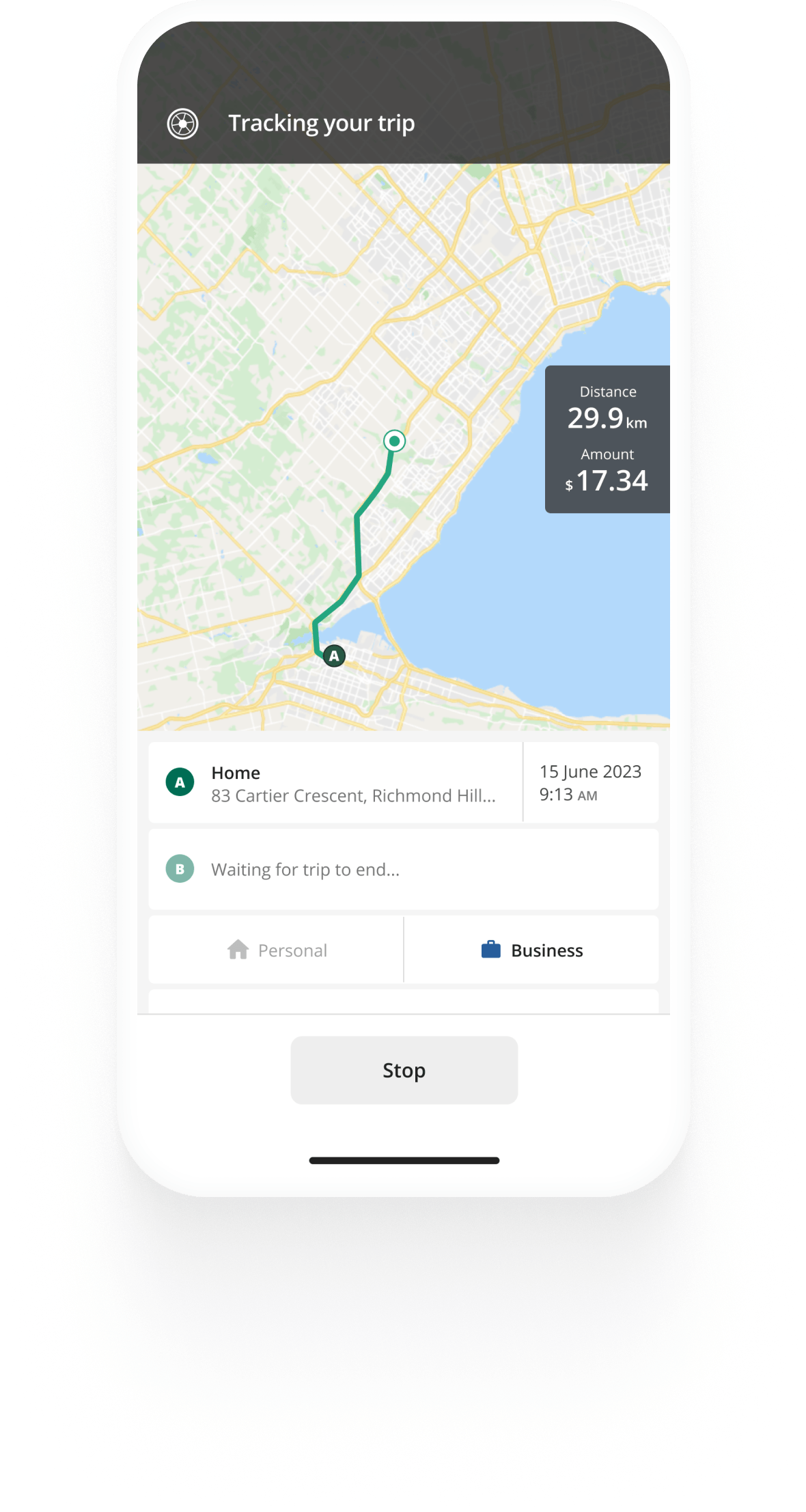Track mileage automatically
Get startedHistoric Mileage Allowance Rates in Canada
The CRA sets annual vehicle allowance rates, often referred to as mileage rates, that employers use to reimburse employees for using their personal vehicles for business purposes. The rates cover all vehicle-related costs, including fuel, maintenance, insurance, and depreciation.
Mileage allowance rates from 2010 to 2025
| Year | First 5,000 km ($/km) | After 5,000 km ($/km) | Additional allowance for the Territories |
|---|---|---|---|
| 2025 | 72c | 66c | 4c |
| 2024 | 70c | 64c | 4c |
| 2023 | 68c | 62c | 4c |
| 2022 | 61c | 55c | 4c |
| 2021 | 59c | 53c | 4c |
| 2020 | 59c | 53c | 4c |
| 2019 | 58c | 52c | 4c |
| 2018 | 55c | 49c | 4c |
| 2017 | 54c | 48c | 4c |
| 2016 | 54c | 48c | 4c |
| 2015 | 55c | 49c | 4c |
| 2014 | 54c | 48c | 4c |
| 2013 | 54c | 48c | 4c |
| 2012 | 53c | 47c | 4c |
| 2011 | 52c | 46c | 4c |
| 2010 | 52c | 46c | 4c |


Track business driving with ease
Trusted by millions of drivers
Automate your logbook Automate your logbook

Automatic mileage tracking and CRA-compliant reporting.
Get started for free Get started for freeChanges in the mileage allowance rates
The CRA revises the rates annually to ensure that employees are fairly compensated for the costs of operating their vehicles. They take into account factors such as fuel prices, inflation, vehicle depreciation, and maintenance costs.
Note that while the CRA issues rates every year, they are not mandatory. Employers can choose to reimburse employees at a different rate. See more about mileage reimbursement for employees and employers.

The rates have gone up nearly every year. This steady rise reflects the increasing vehicle operation costs, especially with inflation and surging fuel prices in recent years.
Mileage allowance rates 2025
Due to high fuel costs, the CRA revised and again updated the 2025 mileage rates by 2 cents.
- 72 cents per km for the first 5,000 km
- 66 cents per km after that
- An additional 4 cents per kilometre for the Territories
Mileage allowance rates 2024
The 2024 rate revision included a 2-cent increase to account for inflation and expensive vehicle maintenance.
- 70 cents per km for the first 5,000 km
- 64 cents per km after that
- An additional 4 cents per kilometre for the Territories
Mileage allowance rates 2023
2023 saw the highest rate increase in the past decade due to the post-pandemic economic recovery, global fuel shortages, and high inflation. The rates went up by 7 cents compared to 2022.
- 68 cents per km for the first 5,000 km
- 62 cents per km after that
- An additional 4 cents per kilometre for the Territories
Mileage allowance rates 2022
The CRA increased the 2022 mileage rates by two cents to account for the increased costs of running and maintaining a vehicle.
- 61 cents per km for the first 5,000 kilometres
- 55 cents per km after that
- An additional 4 cents per km for the Territories
Mileage allowance rates 2021
The CRA revised but did not change the 2021 rates from the previous year, signalling no big change in fuel and vehicle maintenance costs and inflation. The rates remained:
- 59 cents per km for the first 5,000 business kilometres
- 53 cents per km after that
- An additional 4 cents per kilometre for the Territories
Mileage allowance rates 2020
The 2020 allowance rates went up by a cent compared to the previous year, increasing to:
- 59 cents per km for the first 5,000 business kilometres
- 53 cents per km after that
- An additional 4c per kilometre for the Territories
Why do the rates change after 5,000 km
The mileage allowance rate decreases after the first 5,000 kilometres to account for economies of scale. The initial higher rate covers the fixed costs for a vehicle, such as insurance, registration, and basic maintenance. After 5,000 km, the rate is reduced because variable costs like fuel and wear and tear are comparatively lower per kilometre.
The Territories always have a higher rate
The rates for employees in Yukon, the Northwest Territories, and Nunavut are consistently higher than in the rest of Canada. The reasons for this are the harsh weather conditions, which increase vehicle wear and tear, and the higher fuel, vehicle repair, and service in these territories.
FAQ

Tired of logging mileage by hand?
Effortless. CRA-compliant. Liberating.
CRA Mileage Guide
- For Self-Employed
- For Employees
- For Employers
- Mileage Log Requirements
- How To Calculate Mileage Reimbursement
- Is Car Allowance Taxable?
- Claim Motor Vehicle Expenses In 5 Steps
- Current and Historic CRA Mileage Rates
- Historic Mileage Allowance Rates
- Current CRA Mileage Rates